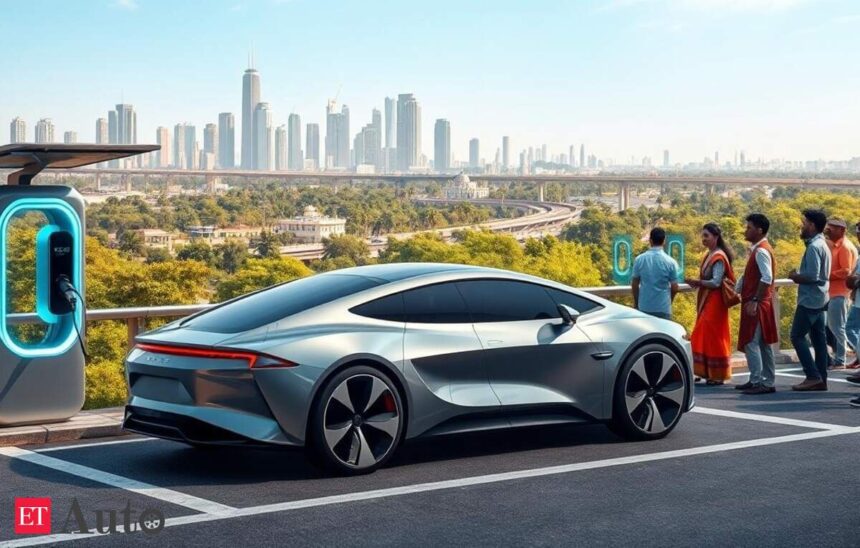Air pollution is one of the most pressing problems facing India’s urban population today. Among the many solutions proposed, the adoption of electric vehicles (EVs) stands out as both viable and urgent. With negligible greenhouse gas emissions during operation, electric vehicles can significantly reduce air pollution in cities, where vehicular emissions remain a major contributor to deteriorating air quality.
Critics argue that if the electricity used to charge EV batteries is generated from fossil fuels like coal or natural gas, then EVs will continue to contribute to carbon emissions—albeit indirectly. While this concern is not unfounded, lifecycle analyses of EVs have consistently shown that, even with current energy mixes, EVs emit far less greenhouse gases over their lifetime compared to internal combustion engine vehicles powered by petrol, diesel, or gas.
Moreover, it is important to recognize that while the manufacturing process of electric vehicles, particularly battery production, does cause some environmental impact, the net emissions over the vehicle’s entire lifespan remain significantly lower than conventional vehicles. This becomes especially relevant in densely populated urban centers like Delhi, Mumbai, Bengaluru, and Kolkata, where air pollution has reached hazardous levels.
Why EVs Matter in Indian Cities
In India’s overcrowded cities, the potential for electric vehicles to improve air quality and reduce health risks is immense. By transitioning from fossil fuel-based transport to electric mobility, these cities can become more liveable and sustainable. However, for electric mobility to be truly effective, a broader ecosystem must also evolve. This includes:
- Generating electricity from renewable energy sources such as solar and wind
- Developing a smart grid for efficient power distribution
- Establishing environmentally sound battery manufacturing and recycling systems
If implemented effectively, this holistic approach could not only reduce emissions but also ensure that EVs contribute positively to India’s long-term environmental and energy goals.
Simultaneously, India must pursue self-reliance in electric vehicle production. Relying solely on imports, particularly in a sector with high strategic value like automobile manufacturing, would be economically short-sighted and counterproductive to national interests. Strengthening the domestic EV industry will also stimulate job creation, economic growth, and technological advancement.
A Booming Market with Huge Potential
According to industry estimates, India’s EV market could be worth $250 billion by 2030. The sector was valued at $1.45 billion in 2021 and grew to $3.21 billion in 2022. In a promising sign, India crossed the one million mark in EV sales last year, and this figure is expected to grow exponentially—reaching 17 million units annually by 2030, according to media reports and market projections.
Many Indian manufacturers are already responding to this demand. Leading companies like Tata Motors, Mahindra & Mahindra, and others have started offering electric versions of their most popular models. These vehicles are not only gaining traction among Indian consumers but are also competitively priced and better suited to local market conditions compared to their global counterparts.
Tesla’s Entry: All Talk, No Action?
One of the most debated issues in India’s EV discourse has been whether American EV giant Tesla would manufacture in India. For years, Tesla lobbied the Indian government for a reduction in import duties, arguing that it wanted to test Indian market conditions by importing cars before committing to local production. However, this tentative approach raised concerns about the company’s real intentions.
It has now become apparent that Tesla is not interested in setting up manufacturing operations in India, at least for the foreseeable future. The Indian government, while announcing its new EV policy, implicitly acknowledged Tesla’s lack of interest. Nevertheless, the policy itself reflects a forward-thinking approach: it seeks to incentivize domestic EV production while cautiously allowing limited imports.
Under the revised EV policy:
- Manufacturers can import up to 8,000 electric cars per year at a reduced import duty of 15%.
- This concession is only applicable for EVs priced above $35,000.
- To qualify, companies must invest a minimum of ₹4,150 crore (approx. $500 million) in setting up a local production plant within three years.
- The total customs duty relief is capped at ₹6,484 crore, ensuring fiscal responsibility.
Additionally, a government portal will soon open for manufacturers to apply under the scheme, remaining active for at least 120 days. To qualify, companies must have:
- A minimum of ₹10,000 crore in global revenue from vehicle manufacturing,
- At least ₹3,000 crore in fixed asset investment.
Both Indian and foreign companies are eligible, provided they meet these requirements. This policy is designed not only to attract investment but also to strengthen India’s status as a global manufacturing hub, in alignment with the ‘Make in India’ mission.
Muted Interest from Global Players
Despite these incentives, global automakers—most notably Tesla and Chinese manufacturer BYD—have shown little enthusiasm. While Tesla has begun appointing dealers in India for its imported models, it remains non-committal about domestic manufacturing. BYD, on the other hand, has refrained from major investment due to India’s security concerns related to Chinese companies, especially those in electronics.
Some experts suggest that other international automakers may still enter the Indian market. However, they face a steep uphill battle. Most of these companies have struggled to generate significant market share even in their home countries. Competing with dominant Indian players like Tata and Mahindra—who have a deep understanding of local demand and cost structures—will be even more challenging.
Economic Growth, Job Creation, and Public Health
Transitioning to electric mobility is not just an environmental necessity—it is also an economic opportunity. Various national studies have shown that clean energy and sustainability initiatives can generate both financial and social benefits, with EVs at the center of this transformation.
India’s EV industry could generate up to 50 million jobs by 2030, spanning vehicle manufacturing, battery production, charging infrastructure, logistics, and maintenance services. Moreover, the sector could add substantial value to India’s GDP, strengthen supply chains, and foster R&D in green technologies.
A major factor deterring foreign companies from investing in India is the cost efficiency of Indian manufacturers. Tata, Mahindra, and other domestic firms can produce EVs at prices ranging from ₹9 lakh to ₹20 lakh per unit, whereas companies like Tesla offer models priced ranging from ₹35 lakh to ₹80 lakh. With India’s luxury car market still relatively small, high-end models do not offer the volume needed to justify large-scale production.
The case for promoting the Make in India electric vehicle ecosystem is compelling. With the right mix of policy incentives, domestic innovation, and infrastructure development, India can position itself as a global leader in electric mobility. EVs can be a cornerstone in solving India’s urban air pollution crisis, while also delivering economic benefits in the form of jobs, investment, and technological advancement.
India does not need to wait for foreign giants to lead this transition. With capable and committed domestic players already driving the movement, the country can chart its own path—clean, competitive, and completely Made in India.
(The author is Ex-Professor, PGDAV College, University of Delhi; Views expressed are personal)






